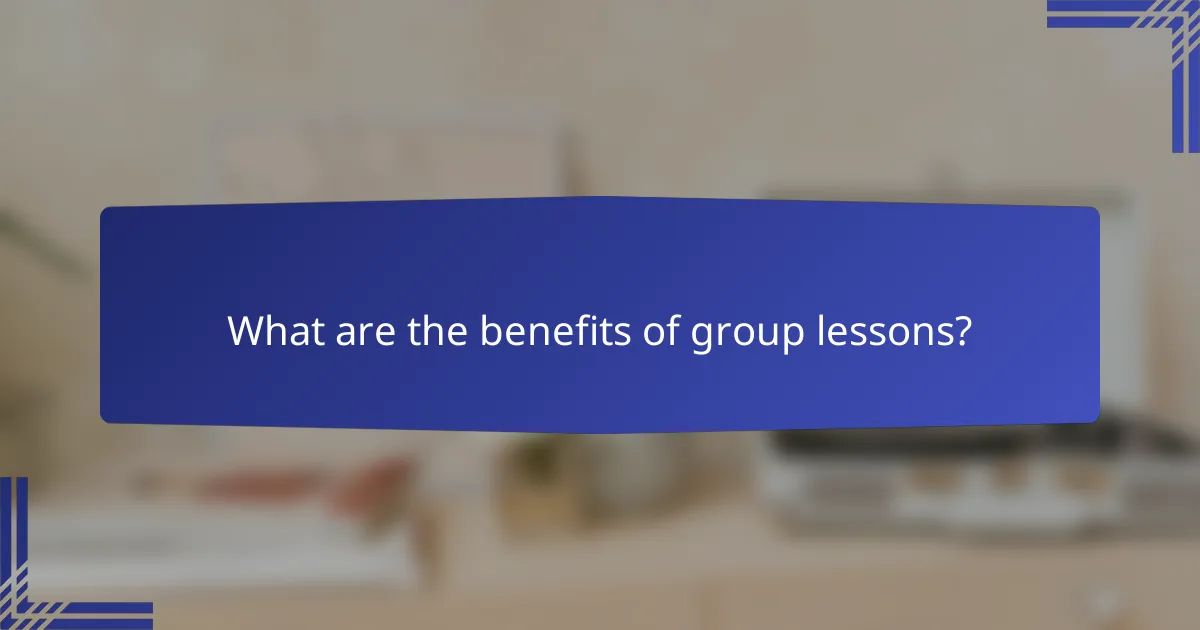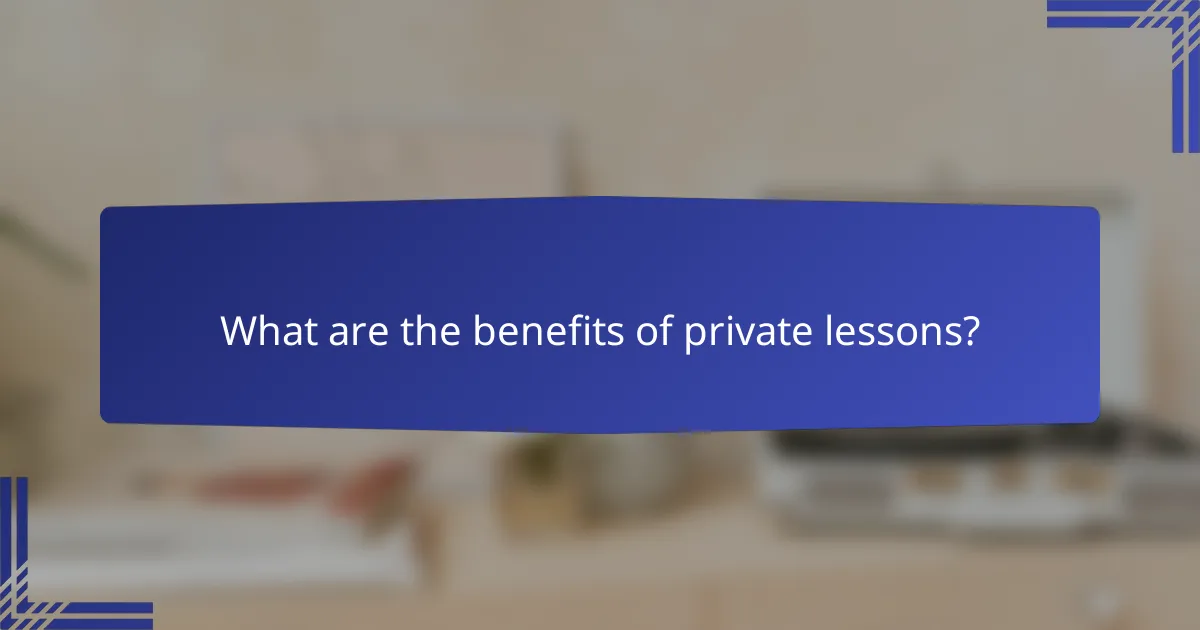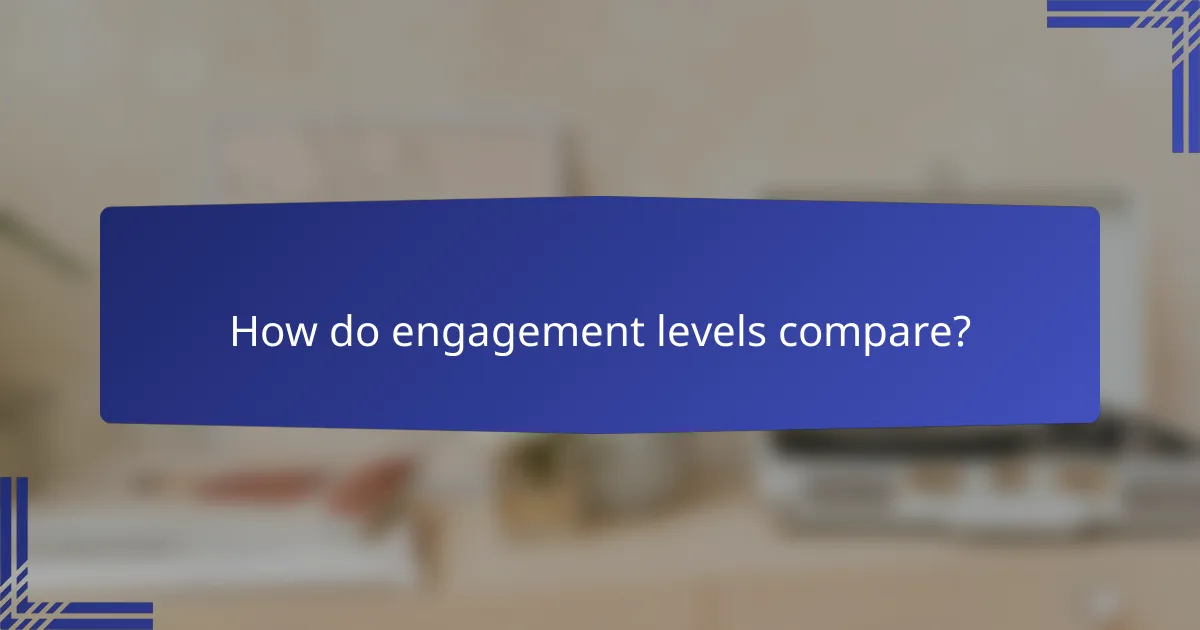When considering educational options, the choice between group lessons and private lessons can greatly influence a student’s learning experience. Group lessons foster social interaction and diverse perspectives, making them cost-effective and enriching. In contrast, private lessons offer personalized instruction tailored to individual learning styles, allowing for focused engagement and immediate feedback. Understanding these differences is essential for maximizing educational outcomes.

What are the benefits of group lessons?
Group lessons offer a range of advantages, including enhanced social interaction, cost-effectiveness, and opportunities for diverse perspectives. These benefits can significantly enrich the learning experience and foster a supportive environment.
Enhanced social interaction
Group lessons facilitate social interaction among participants, which can lead to stronger relationships and a sense of community. Engaging with peers allows learners to share experiences, discuss challenges, and celebrate achievements together.
This social aspect can be particularly beneficial for younger learners or those new to a subject, as it helps reduce feelings of isolation and encourages collaboration. Group dynamics often lead to a more enjoyable and engaging learning atmosphere.
Cost-effectiveness
Group lessons are typically more affordable than private lessons, making them accessible to a wider audience. Participants can benefit from professional instruction at a lower cost per person, which can be particularly appealing for families or individuals on a budget.
Many educational institutions and community centers offer group classes at competitive rates, often providing discounts for multiple sessions or larger groups. This cost-effectiveness can enable learners to pursue their interests without financial strain.
Variety of perspectives
In group lessons, learners are exposed to a variety of perspectives and approaches to the subject matter. This diversity can enhance understanding and stimulate critical thinking, as students learn from each other’s insights and experiences.
For example, in a language class, different students may have unique cultural backgrounds that influence their understanding of language nuances. This variety enriches discussions and broadens the learning experience for everyone involved.
Motivation through peer support
Group lessons foster a sense of camaraderie, which can motivate participants to stay engaged and committed to their learning goals. The presence of peers encourages accountability and can inspire individuals to push their limits.
When learners see their peers making progress, it can ignite a healthy competitive spirit and drive them to improve as well. This supportive environment often leads to increased persistence and resilience in the face of challenges.
Structured learning environment
Group lessons typically provide a structured learning environment, which can help learners stay focused and organized. Instructors often design lessons that progress logically, ensuring that all participants are on the same page.
This structure can be particularly beneficial for those who thrive in organized settings, as it allows for clear expectations and a defined path to mastery. Additionally, group lessons often incorporate collaborative activities that reinforce learning objectives and enhance retention.

What are the benefits of private lessons?
Private lessons offer tailored instruction that caters to individual learning styles and needs, enhancing the overall educational experience. They provide a focused environment where students can progress at their own pace and receive immediate feedback from their instructors.
Personalized attention
In private lessons, students receive one-on-one attention from their instructors, allowing for a more customized learning experience. This personalized approach helps identify specific strengths and weaknesses, enabling targeted skill development.
For example, if a student struggles with a particular concept, the instructor can spend additional time addressing that issue without the distraction of a group setting. This focused interaction fosters a deeper understanding of the material.
Flexible scheduling
Private lessons typically offer more flexible scheduling options compared to group classes. Students can arrange sessions at times that fit their personal schedules, making it easier to balance education with other commitments.
This flexibility is particularly beneficial for busy professionals or students involved in extracurricular activities, as they can choose lesson times that work best for them, whether early in the morning or late in the evening.
Customized learning pace
With private lessons, students can learn at their own pace, which is crucial for effective mastery of new skills. Some may grasp concepts quickly, while others may need more time to fully understand the material.
This individualized pacing allows instructors to adjust the curriculum based on the student’s progress, ensuring that no one feels rushed or held back. For instance, a student may spend more time on foundational skills before advancing to more complex topics.
Focused skill development
Private lessons allow for concentrated skill development tailored to the student’s goals. Instructors can design lessons that specifically target the skills the student wishes to improve, whether it’s mastering a musical instrument, enhancing language proficiency, or developing athletic abilities.
This targeted approach can lead to faster improvement and greater satisfaction, as students see tangible progress in the areas they care about most.
Direct feedback from instructors
One of the key advantages of private lessons is the opportunity for direct and immediate feedback from instructors. This real-time critique helps students understand their mistakes and learn from them right away.
For instance, an instructor can provide specific suggestions on technique or performance during the lesson, allowing students to make adjustments on the spot. This immediate feedback loop enhances learning and retention of skills.

How do engagement levels compare?
Engagement levels in group lessons and private lessons differ significantly, impacting the learning experience. Group lessons often promote social interaction, while private lessons provide tailored attention that can enhance focus.
Group dynamics foster engagement
Group lessons leverage social interactions, creating a dynamic environment where learners can motivate each other. This setting encourages participation through discussions, collaborative activities, and peer feedback, which can enhance retention and understanding.
In group settings, learners often feel a sense of belonging, which can increase their motivation to engage actively. For example, group projects or discussions can lead to a richer learning experience as students share diverse perspectives.
Private lessons allow for deeper focus
Private lessons provide individualized attention, allowing instructors to tailor their teaching methods to the specific needs of the student. This focused approach can lead to a deeper understanding of complex topics, as the learner can ask questions and receive immediate feedback.
In a one-on-one setting, distractions are minimized, enabling the student to concentrate fully on the material. This is particularly beneficial for learners who may struggle in group environments, as they can progress at their own pace without the pressure of peers.
Different engagement strategies
Engagement strategies vary between group and private lessons, each with its unique advantages. In group lessons, strategies like gamification, team challenges, and collaborative projects can enhance participation and enjoyment.
Conversely, private lessons might employ strategies such as personalized goal-setting, targeted exercises, and frequent assessments to maintain engagement. Understanding these strategies can help learners choose the format that best suits their learning style and objectives.

What learning styles benefit from group lessons?
Group lessons are particularly beneficial for learners who thrive in collaborative environments and enjoy social interactions. These lessons foster engagement through shared experiences, allowing participants to learn from one another while enhancing their understanding of the material.
Collaborative learners
Collaborative learners excel in environments where teamwork and group dynamics play a crucial role. In group lessons, they can engage in discussions, share ideas, and tackle problems collectively, which reinforces their learning. This approach not only deepens their comprehension but also builds essential skills such as communication and conflict resolution.
To maximize the benefits, collaborative learners should seek out group lessons that encourage active participation and provide opportunities for peer feedback. Engaging in projects or activities that require teamwork can further enhance their learning experience.
Social learners
Social learners thrive on interaction and often prefer learning in a community setting. Group lessons cater to their need for connection, allowing them to engage with peers and instructors alike. This social aspect can make learning more enjoyable and less intimidating, leading to higher motivation and retention of information.
To support social learners, group lessons should incorporate icebreakers, group discussions, and collaborative tasks. These elements can help create a welcoming atmosphere that encourages participation and fosters relationships among learners.
Visual and auditory learners
Visual and auditory learners benefit from the diverse stimuli present in group lessons. Visual learners can take advantage of charts, diagrams, and demonstrations, while auditory learners can absorb information through discussions and verbal explanations. The combination of these learning styles in a group setting can enhance understanding and retention.
Instructors should utilize a mix of visual aids and auditory techniques during group lessons to cater to both types of learners. For example, incorporating multimedia presentations alongside group discussions can create a more engaging and effective learning environment.

What learning styles benefit from private lessons?
Private lessons are particularly advantageous for learners who thrive on individualized attention and tailored instruction. These lessons cater to specific learning styles, allowing for a customized approach that can enhance understanding and retention.
Independent learners
Independent learners often prefer to take control of their educational journey, seeking personalized guidance to explore topics at their own pace. Private lessons provide the flexibility to focus on areas of interest or difficulty without the distractions of a group setting.
For independent learners, the one-on-one interaction with an instructor can foster deeper engagement and accountability. They can set their own goals and receive immediate feedback, which is crucial for self-directed study.
Kinesthetic learners
Kinesthetic learners benefit from private lessons as they often require hands-on activities to grasp concepts effectively. In a private setting, instructors can design lessons that incorporate physical movement and practical exercises tailored to the learner’s needs.
For instance, a kinesthetic learner studying a musical instrument can receive immediate guidance on technique and practice routines, allowing for a more interactive and engaging experience. This personalized approach helps reinforce learning through active participation, making it easier for these learners to absorb new information.
